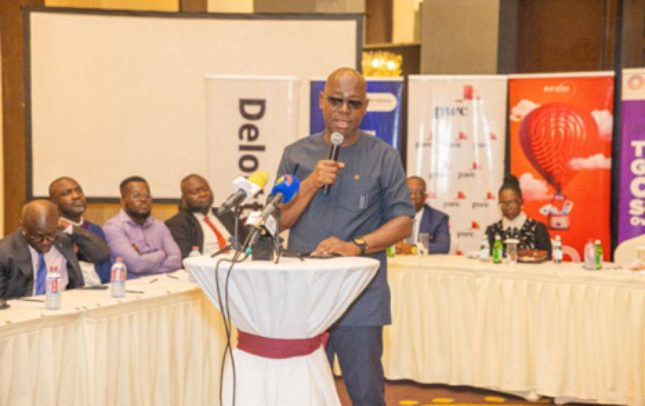Moses Kwesi Baiden Jnr.
The CEO and Founder of Margins ID Group, Moses Kwesi Baiden Jnr., says the deepening global trade tensions, symbolized by escalating tariff wars and rising protectionism, should serve as a stark wake-up call for Africa.
According to him, as countries turn inward, the illusion of a borderless economy is unraveling, noting that in this fractured global order, Africa must urgently secure its technological sovereignty, not tomorrow, but now.
Speaking at the launch of the 2025 CEO Summit in Accra, Mr. Baiden Jnr. called on business leaders, policymakers, and entrepreneurs to help Africa build and own its technology.
Under the summit theme, “Leading Ghana’s Economic Reset: Transforming Business and Governance for a Sustainable Futuristic Economy,” Mr. Baiden urged the private sector to lead Africa’s digital journey on its own terms.
“Africa must not remain on the periphery of global transformation,” he said, and continued, “We must build an Africa where data is sovereign, systems are secure, and innovation is homegrown. The time for building is now. In the world that’s coming, you either build or you are built.”
Risks of Technological Dependence
Mr. Baiden warned that recent disruptions in cloud-based tools and storage systems exposed Africa’s vulnerability. Many platforms African firms rely on are controlled by foreign entities, subject to geopolitical interests.
“Imagine a future where your corporate memory, your data, your identity can disappear overnight—not due to your failure, but because of decisions made halfway across the world,” he cautioned.
The Margins ID Group boss said without decisive action, Africa could become a “digital colony,” dependent on systems it does not control, bound by rules it did not write, and vulnerable to unpredictable disruptions.
Participate or Perish
As the Fourth Industrial Revolution transforms industries with AI, automation, and digital connectivity, Baiden emphasized that Africa must engage boldly.
“The future belongs to those who create it,” he declared. “Let us not wait to be invited to the table. Let us set the table.”
He stressed that Africa must design transparent, ethical, and inclusive systems, with private sector leadership rooted not only in capital but also in courage and vision.
Homegrown innovation must be capable of scaling globally, he said, warning that Africa risks being defined by others if it fails to act.
Reimagining Business and Governance
The challenge, Baiden pointed out, is not just technological but institutional, pointing out that
Africa must rethink governance, education, and public-private partnerships.
For him, CEOs and business leaders must be a force for good—reforming production systems, governance frameworks, and championing long-term, values-driven transformation.
“The future demands governance, compliance, transparency, and effectiveness embedded in both public and private institutions,” Mr. Baiden said.
Strategic Imperative for Sovereignty
He asserted that in the 21st century, sovereignty will be defined by code, data, algorithms, and systems, and not merely borders or resources.
Digital sovereignty, Mr. Baiden argued, is about self-determination and ensuring African voices shape global systems.
He urged African governments to design national platforms that protect citizen data and foster local innovation, while insisting that the private sector must lead with intention.
“We cannot be spectators in a future designed by others. If we do not act now, we risk becoming casualties of it,” he warned.
Africa’s Future Must Be Built, Not Imported
He stressed that Africa must not wait for handouts or policy shifts, as nations retreat behind trade walls, intimating that its future will depend on the institutions it builds, the talent it nurtures, and the technologies it owns.
A Business Desk Report


